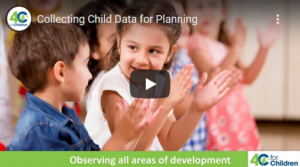 The resources and videos in the 4C for Children Early Childhood Education Best Practices Library includes strategies that align with leadership, classroom and nutrition best practices, as well as Step Up To Quality standards that you can put into action in your program.
The resources and videos in the 4C for Children Early Childhood Education Best Practices Library includes strategies that align with leadership, classroom and nutrition best practices, as well as Step Up To Quality standards that you can put into action in your program.
Our video highlight for today is Collecting Child Data for Planning. Collecting data on children’s development is an important step in the planning process. This video will discuss different methods of collecting evidence and how to organize it into a usable system.
One of the purposes behind screening and assessment is to collect data on each child’s development. This information will help drive your planning process by highlighting children who made need extra support, and pinpointing those ready for a challenge. This also allows you to start intentionally planning for children. Screening and assessment is a snapshot in time of a child’s development, and it is useful for planning, however there are other useful bits of information to gather as well, to help guide you as you plan.
Here are some tips and strategies to assist you in collecting data to help guide your lesson planning for children in your child care program:
- Observe all areas of development
- Make anecdotal notes by writing down your objective observations. Only state what you see and hear.
- Find collection strategies that work for you such as:
- Keeping a paper and pencil close by to jot down notes
- Take photos as a visual reminder
- Collect children’s work samples
The more we engage with children, the more we will know and the better we can plan for them. Choose the system that works best for you and the group of children you care for.
Related Training
Search on 4cforchildren.org/training for the following titles:
- Keep It Informal: All About Assessment Planning
- The Social-Emotional Field Guide: Observation and Assessment
- Screening and Assessment 1: An Overview of Early Childhood Assessment Practices
- Screening and Assessment 2: Developmental and Behavioral Screening Practices
- Before Assessment: Observation
- Assessment 101